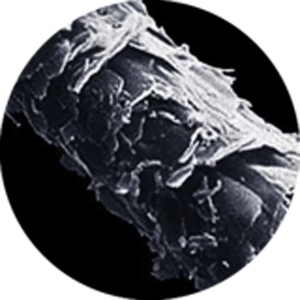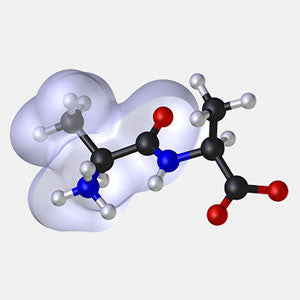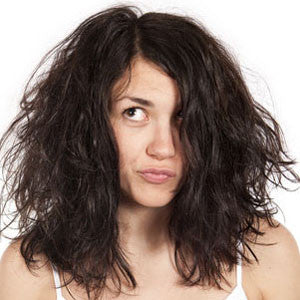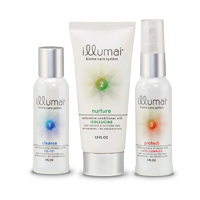Why is My Hair so Frizzy? (And What Can I do About It?)

Frizz occurs when the outer layer of your hair (the cuticle) is lifted instead of smoothed down. This lift separates the cuticle and allows moisture to move freely through your hair shaft. As the strands take in moisture, they swell and warp, creating a frizzy look.
Sebum, a natural hair lubricant produced by glands in the scalp, keeps hair moisturized, smooth and shiny. It also provides a barrier against allowing too much moisture in from the environment.
While curly hair isn’t the only culprit for frizz, waves and curls can slow the sebum from traveling down the full length of the hair shaft and block the ends from getting enough of the sebum it needs.
Those with chemically treated hair are also at a high risk for frizzy locks. Chemical treatments strip your hair of oils and peptides, causing split ends and breakage. Broken hair and a lack of moisture are the perfect duo for a frizzy look.
How Can I Fix My Frizzy Hair?
- Close the vapor barrier. The normal, healthy hair shaft is covered with a thin waxy layer of lipids that keep out moisture from the environment. When this "waterproofing" outer layer is damaged (by coloring or the use of conventional shampoos), the hair absorbs moisture from the environment, causing the hair shaft to warp and bend, resulting in "frizz." To prevent this from happening the waterproofing layer must be restored. Although there are many products that claim to tame the frizz - conditioner, silicone-laden oils, and teflon containing anti-frizz spray - you need to look for products that behave like the proteins and lipids naturally produced in your dermal biome. Heavy synthetic products tend to hide damage rather than actually repairing it. As a temporary solution light application of coconut or avocado oil can provide some benefit. But the best approach is to adopt a practice of shampooing that both preserves and restores the biome of your scalp and hair.
- Limit your use of heating. Using heat to style your hair can be damaging. The more damage it has, the more it will frizz. Styling wet hair with a round brush and a blow dryer can reduce the frizz and leave minimal damage to your hair. Use a heat protectant finishing spray and a diffuser for maximum protection. Finishing sprays help keep your hair moisturized when applying heat, and hair dryer diffusers spread the heat across more surface area, which is less intense on your hair.
- Beware of your brushing habits. Dry, frizzy hair can become even more unruly when brushed. Your best bet when detangling frizzy hair is to do so with a wide toothed comb when the hair is wet. This eliminates breakage and keeps the hair smooth.
- Consider changing your diet. What you put in your mouth can have a big effect on your hair. Since one of the main causes of frizzy hair is dehydration, it should come as no surprise that you should drink more water. Water will help moisturize your hair from the inside out. Fruits, veggies and whole grains are also suggested because they contain vitamins like biotin, vitamin A and vitamin E. These are all great for hair health.
- Wash with caution. It can be helpful to limit shampooing to only when necessary. More time between washes can mean more time for your sebum to make its way down your strands.
It’s also important to pay attention to the type of shampoo you’re using. Make sure that products intended to tame frizz are free of sulfates and sulfate-like chemicals.
When applying your shampoo, wash from the roots down. The ends of your hair shouldn’t receive as much shampoo since they don’t get as many natural oils as the hair by your scalp. Heavily shampooing your ends could cause dryness and breakage.
- Avoid styling products made with alcohol. Many styling products contain alcohol. While they might keep your hairstyle in place, products with alcohol can dry out your hair. Check the labels on your hairspray, gel, mousse and others. There are many alternatives that don’t include this pesky ingredient.
Learn More . . .

What are Sulfates? And Why Should You Care if a Shampoo is Sulfate-Free?
Sulfates, such as sodium lauryl sulfate (SLS), are chemicals used to create strong detergents. Because they are such efficient cleansers and degreasers, sulfates are commonly used in manufacturing and construction industries to clean heavy machinery.

How to Care for Color Treated Hair


